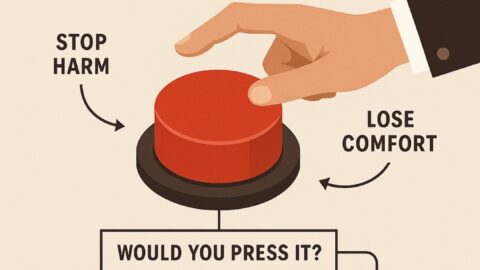“Evil is whatever distracts.” — Franz Kafka
Franz Kafka’s profound statement suggests that evil doesn’t always manifest as overt malice, cruelty, or destruction—it can also appear as distraction. Anything that diverts us from our purpose, values, responsibilities, or connection to what truly matters can be considered a form of evil.
In a world overflowing with distractions, Kafka’s insight urges us to consider how distraction undermines us emotionally, physically, mentally, spiritually, and in our relationships with God, family, and country.
Emotional Distraction
A. The Nature of Emotional Distraction
- Emotional distractions can come from toxic relationships, unresolved conflicts, or shallow emotional engagements (e.g., constant scrolling on social media to seek validation).
- They pull our focus away from self-awareness, emotional growth, and genuine connections.
B. The Impact of Emotional Distraction
- Stunted Emotional Growth: Constant distraction prevents us from processing emotions in a healthy way.
- Superficial Connections: Shallow, distracted emotional interactions can leave us feeling isolated and unfulfilled.
- Emotional Burnout: Overexposure to trivial emotional stimuli (e.g., drama, outrage culture) depletes our emotional reserves.
C. Overcoming Emotional Distraction
- Mindfulness: Focus on your emotions in the present moment.
- Emotional Boundaries: Distance yourself from emotionally draining people or environments.
- Deep Relationships: Invest in fewer, but more meaningful relationships.
Physical Distraction
A. The Nature of Physical Distraction
- Physical distractions can include poor health habits, substance abuse, laziness, or excessive indulgence in physical pleasures (e.g., overeating, oversleeping).
- They divert us from maintaining a balanced and healthy lifestyle.
B. The Impact of Physical Distraction
- Health Decline: Ignoring physical well-being leads to chronic illness and diminished quality of life.
- Physical Weakness: A distracted approach to health reduces resilience and energy levels.
- Dependency: Distractions like substance abuse or screen addiction create physical dependencies.
C. Overcoming Physical Distraction
- Routine and Discipline: Build consistent habits for sleep, exercise, and nutrition.
- Eliminate Temptations: Reduce access to physically harmful distractions.
- Purpose-Driven Health Goals: View health as a tool to fulfill your life’s purpose.
Mental Distraction
A. The Nature of Mental Distraction
- Mental distractions include information overload, excessive entertainment, aimless scrolling, and shallow thought patterns.
- They prevent us from deep thinking, problem-solving, and intellectual growth.
B. The Impact of Mental Distraction
- Decreased Focus: Short attention spans reduce productivity and creativity.
- Intellectual Stagnation: Lack of meaningful mental engagement stunts growth.
- Anxiety and Overwhelm: Endless mental noise leads to feelings of unease and restlessness.
C. Overcoming Mental Distraction
- Focused Time Blocks: Use techniques like the Pomodoro Technique for focused work.
- Limit Information Overload: Curate your media consumption carefully.
- Engage in Deep Work: Spend time on activities requiring sustained focus and creativity.
Spiritual Distraction
A. The Nature of Spiritual Distraction
- Spiritual distractions include materialism, egocentrism, and shallow pursuits that pull us away from self-transcendence, inner peace, and purpose.
- They divert us from reflecting on life’s deeper meaning and our place in the universe.
B. The Impact of Spiritual Distraction
- Loss of Purpose: A distracted soul becomes directionless and apathetic.
- Inner Void: Spiritual neglect often leaves a feeling of emptiness and dissatisfaction.
- Moral Drift: Without spiritual grounding, one can lose sight of ethical principles.
C. Overcoming Spiritual Distraction
- Reflection and Prayer: Spend regular time in silence, prayer, or meditation.
- Prioritize Spiritual Practices: Attend religious services, study sacred texts, or practice rituals.
- Seek Community: Surround yourself with others who share your spiritual values.
Distraction from God
A. The Nature of Distraction from God
- Materialism, ego, and worldly pursuits often take precedence over a relationship with God.
- Distractions can include endless entertainment, pursuit of status, or even complacency in faith.
B. The Impact of Distraction from God
- Spiritual Disconnect: A loss of intimacy with God and a lack of purpose.
- Moral Confusion: Without a divine compass, morality can become subjective.
- Fear and Doubt: Absence of faith can lead to overwhelming anxiety and hopelessness.
C. Overcoming Distraction from God
- Daily Devotion: Spend time in prayer, scripture reading, or worship.
- Gratitude Practice: Focus on recognizing blessings in your life.
- Live Your Faith: Act in alignment with your spiritual principles.
Distraction from Family
A. The Nature of Distraction from Family
- Distractions such as workaholism, technology, and selfish pursuits can erode family bonds.
- Quality time is often replaced by passive, distracted presence.
B. The Impact of Distraction from Family
- Broken Relationships: Emotional distance grows in families without intentional connection.
- Neglect: Children or partners may feel overlooked and undervalued.
- Regret: Missed opportunities for bonding can lead to lifelong regrets.
C. Overcoming Distraction from Family
- Prioritize Family Time: Schedule regular quality time with family.
- Be Present: Remove distractions (phones, work emails) during family interactions.
- Listen and Communicate: Build open and honest communication channels.
Distraction from Country
A. The Nature of Distraction from Country
- Citizens are often distracted by division, misinformation, or apathy towards societal responsibilities.
- Patriotism is replaced by cynicism or self-interest.
B. The Impact of Distraction from Country
- Civic Apathy: A disengaged population leads to poor governance.
- Division and Conflict: Distractions can amplify societal fractures.
- Loss of National Identity: Distraction erodes shared values and purpose.
C. Overcoming Distraction from Country
- Stay Informed: Engage critically with reliable sources of information.
- Civic Engagement: Participate in voting, volunteering, and community service.
- Unity Over Division: Focus on common values rather than differences.
Final Reflection
Kafka’s statement is not just a philosophical observation—it’s a warning. Distractions aren’t always loud or obvious; they often creep in quietly, subtly, and persistently.
- Emotionally: They disconnect us from real feelings.
- Physically: They damage our health.
- Mentally: They weaken our focus and intellect.
- Spiritually: They pull us away from deeper meaning.
- Relationally: They erode our bonds with God, family, and country.
The Cure for Distraction:
- Intention: Know your priorities and purpose.
- Discipline: Remove unnecessary distractions.
- Focus: Invest your time and energy intentionally.
In short:
“Evil thrives in distraction. Focus thrives in intention. What you give your attention to shapes your soul, your relationships, and your legacy.”







